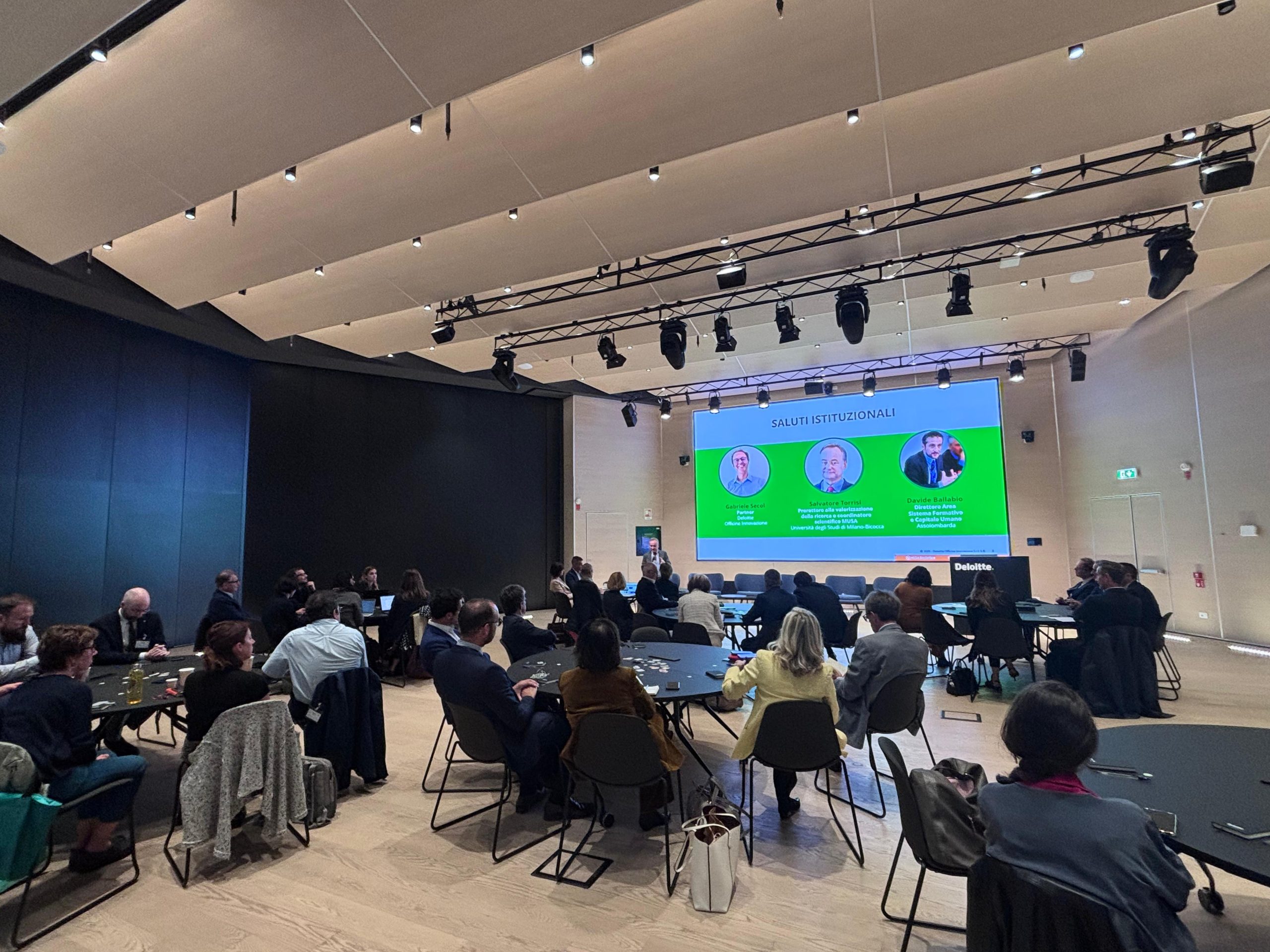"The report, produced by Deloitte for MUSA, outlines an integrated strategy to enhance the skills of researchers funded by the PNRR, promoting their entry into the job market and structured dialogue between universities and businesses."
The study, “Integrated strategy for the knowledge transfer of resources deriving from research”, developed by Deloitte to enhance the results of three years of activity carried out with MUSA – Multilayered Urban Sustainability Action, was presented on October 13th at the Deloitte headquarters in Milan during the event “Enhancing the human capital of research: synergies for the future”, organized in collaboration with Assolombarda.
The report analyzes the characteristics and aspirations of research personnel and the meeting point between the demand and supply of highly qualified profiles, with a specific focus within MUSA, which was created with the contribution of Assolombarda. It outlines a strategy for the transfer of knowledge developed within universities toward the productive and institutional system, with a view to territorial impact and long-term sustainability.
Who are the MUSA researchers?
The report profiles a population of over 300 researchers employed in MUSA projects, originating from Politecnico di Milano, Università degli Studi di Milano, Università degli Studi di Milano-Bicocca, and Bocconi.
The average age is 34 years, and over 60% are under 35: a young, highly qualified generation, open to the international dimension, and ready to put their skills at the service of national innovation.
The MUSA project represents a unique laboratory for analyzing how research can translate into new professional, entrepreneurial, and development opportunities for the territories.
DATA BOX – Employment Trends | Key highlights
- 59% of MUSA researchers who participated in the survey are looking for new job opportunities.
- 76% of those actively seeking employment positively evaluate the possibility of professional paths outside the academic sphere.
- Among those actively seeking work, including in non-academic fields:
- 94% state they are available to undertake a professional career in a company;
- 74% state they are available to start entrepreneurial activities, individually or in a team.
- 42% of survey respondents state they perform research activities with an impact on multiple sectors and technological areas (AI, energy, healthcare, digital services, etc.).
Beyond Academia: Skills that create a system
The results highlight a high potential for the transferability of skills acquired by highly educated academic figures toward the business world, particularly in the engineering, economics, and digital services sectors.
Among the areas for improvement most cited by researchers are:
- Management of resources and processes;
- Team management and leadership skills;
- Digital and technological competencies.
At the same time, the most common soft skills – problem solving, reliability, adaptability, empathy, relational skills – confirm that the human capital of research can make a decisive contribution to the organizational and cultural transformation of companies.
Universities and Businesses: an alliance for growth
The document underlines the growing role of collaborations between universities and businesses, such as co-funded PhDs, industrial PhDs, joint laboratories, and applied research paths.
These tools are proving fundamental for accelerating technology transfer and making university research a stable lever for competitiveness.
One of the current market challenges is to extend these models also to SMEs (Small and Medium-sized Enterprises), which primarily make up the national productive fabric. To date, R&D spending in these realities is generally more contained than in large companies, as are employment opportunities for highly qualified profiles.
The New Frontiers: AI and Big Data for sustainability
Among the most dynamic research areas are Artificial Intelligence and Big Data, considered enabling technologies capable of generating cross-sectoral impacts on various sectors (e.g., healthcare, energy, finance, Public Administration, etc.).
Nearly 42% of MUSA researchers work on projects that have a cross-sectoral impact, confirming research oriented toward the digital and sustainable transformation of urban systems.
A Plan for the post-PNRR era
The Post-PNRR Knowledge Transfer Plan outlined by Deloitte proposes a systemic approach that centers people and their skills as a lever for social, territorial, and economic development.
The objective is to build an integrated model for valuing research that continues to produce innovation beyond the public funding phase, consolidating MUSA’s role as a ** stable ecosystem for collaboration among universities, businesses, and institutions.**





